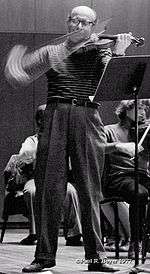Paul Rolland
Paul Rolland, né Pali Reisman (November 21, 1911, Budapest – November 9, 1978, Illinois),[1] was a violist and an influential American violin teacher who concentrated on the pedagogy of teaching fundamentals to beginning string students. He was famous for emphasizing that the physical demands of most violin techniques can be taught ("in embryonic form") in the first two years of violin education. He advocated that teachers learn and teach freedom of movement and use clear, specific and concise instructions when teaching. His approach to pedagogy was extremely analytical, and his teaching approach was highly systematic and logical. His wife said of his work "Every possible movement in string playing was analyzed.... Different methods do indeed exist, but none more fundamental.... Paul never harmed anyone's playing. He helped a person through certain body movements and the knowledge of what those body movements meant physically, in the scientific way of playing the violin."[Cite]

Education and performing career
Paul Rolland earned a Bachelor of Music degree from Simpson College, Indianola, Iowa and a Master of Music degree from the Franz Liszt Academy of Music in Budapest, Hungary. He was the first violist of the Budapest Symphony, and later played viola in the Pro Ideale and Lener String Quartets. When faced with the decision between continuing to perform and developing his teaching approach, he chose teaching.
Publications
Rolland advocated teaching in classes (masterclass style), and made his own teachings and insights available in a set of videos and a book titled The Teaching of Action in String Playing. His ideas and methods were also documented in the University of Illinois String Research Project films. He helped to found the American String Teachers Association, and in 1950 became the first editor of its journal American String Teacher. He also published numerous articles on string pedagogy in the International Musician, The School Musician, Violins, The Instrumentalist, and the Journal of Research in Music Education.
He also published a large number of books on string pedagogy.
The Sousa Archives and Center for American Music at the University of Illinois at Urbana-Champaign holds the Paul Rolland Papers, which consists of correspondence and publicity, as well as films and audio recordings related to the development of "The Teaching of Action in String Playing."
Sources
- Eisele, Mark Joseph. The Writings of Paul Rolland: An annotated bibliography and a biographical sketch (PDF). Archived from the original (PDF) on 2006-10-20. Retrieved 2006-11-10.
- Music Library - University of Illinois Catalog entry. "Collection: Rolland". Retrieved 2006-11-10.
- Sousa Archives and Center for American Music, Finding Aid for Paul Rolland Papers, 1939-83, 1986-87, 1992
References
- Fanelli, Michael P. (2001) Paul Rolland: His teaching career and contributions to string pedagogy and education. (Doctoral Dissertation) Retrieved from ProQuest Dissertations and Theses (UMI No. 3017071)